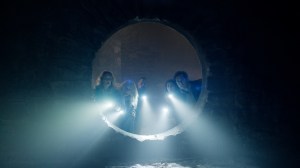The Alien franchise is tricky: at first glance, Ridley Scott’s 1979 classic is a simple thing: a claustrophobic battle with a nightmarish monster, in the most perilous environment: a highly concentrated dose of sci-fi/horror tropes. However, as time has passed (and Alien expanded into a massive franchise universe), it has become increasingly clear that Scott injected a great deal more complexity into his film than it initially seems: Dark ruminations on biology and birth; deeper sci-fi quandaries about artificial intelligence vs humanity; socio-political concerns about corporate corruption and class warfare, and genetic theories about mutation and evolution that evolve with the times. Well, modern-day television auteur Noah Hawley (FX’s Fargo and Legion) is no stranger to tackling the headier concepts buried in pulpy genre fare. It’s not that surprising, then, that he takes bold and expansive creative strides forward with the concepts and themes of the Alien franchise, in its first TV series, Alien: Earth.
Videos by ComicBook.com
The series is set in 2120, two years before the USCSS Nostromo would discover and harvest the xenomorph lifeform on LV-426. For the first time in the Alien franchise, we get a look at Earth itself, a planet now ruled by three megacorporations and the trillionaires who run them. As fans know all too well, the Weyland-Yutani corporation is already one generation deep into the nefarious task of scouring the galaxy for the most dangerous lifeforms that can be engineered into bio-weapons. The company vessel USCSS Maginot is headed back to Earth with the most dangerous samples that have been collected over the decades-long voyage; due to mysterious circumstances, the ship gets sabotaged and the monsters get loose, causing the Maginot to crash-land. Unfortunately for Weyland-Yutani, the crash site is a skyscraper belonging to rival megacorporation Prodigy, which is owned by the youngest trillionaire in history, Boy Kavalier (Samuel Blenkin). Boy has been taking leading strides in the race to achieve post-human evolution with the hybrid beings known as his “Lost Boys,” a group of terminally ill human children whose consciousnesses are transferred to adult android bodies. However, when Boy realizes what is on the Weyland-Yutani ship, alien bioweapons become his only immediate focus, and he sends his Lost Boys to retrieve them.
Alien: Earth manages to succeed where so many other television spinoffs of film franchises often fail: it finds a way to justify its long-form format. The series is smartly paced across its eight-episode run; slower stretches of character development and world-building segue smoothly into several key arcs of action-horror that feel on par with the feature films. FX doesn’t side-step the production demands: the set pieces, costumes, creatures, and overall visual effects feel cinematic when required, even if other scenes of dialogue or development use more budgeted means like blue screen backgrounds to save on budget. If nothing else, Alien: Earth is proof of concept that the franchise “works” in the TV format.

The cast and characters are more of a mixed bag. There are clear standouts in the lead ensemble: Sydney Chandler (daughter of actor Kyle Chandler) is something of a breakout surprise as Wendy, nailing the subtlety and nuance of a young girl relocated to an adult body, learning and evolving faster than anyone can predict. Timothy Olyphant (Justified, The Mandalorian) is also a scene-stealer as Kirsh, an elder synthetic who manages the Lost Boys squad. Olyphant is one of the better character actors working in TV, and the idiosyncratic manner in which he plays a machine man could be an entire show all its own. Samuel Blenkin is up there with Olyphant, tightrope walking a line between naive child and tech-bro mogul who’s a smiling, scraggly-haired sociopath. Rounding out the list of breakout actors is Babou Ceesay as Morrow, the cyborg security officer of the Maginot who takes up his own clandestine mission to recapture Weyland-Yutani’s lost assets. Other members of the cast (like the other members of the Lost Boys, or Boy’s team of scientists, or Yutani herself) don’t feel like crucial parts of the ensemble, and at times weigh down the otherwise tight pacing.
While it is, overall, a dark and thrilling immersion into the Alien universe, Earth isn’t immune to criticism. As usual, Hawley’s idiosyncrasies are a big part of his cinematic style (love it or hate it); Alien: Earth certainly reflects a lot of them. Spiraling camera shots; slow, quiet sequences of characters reflecting and/or contemplating, and those long musical montages that periodically re-establish where things now stand. And, of course, there are the sudden swerves from the expected storytelling path into the kind of detours that feel like they could derail a series in the hands of a lesser showrunner.
As with any long-form TV series that’s built off a movie, there are inevitable points of lag in Alien: Earth, or subplots that just don’t carry the same gravitas as others. Luckily, Hawley keeps the majority of the screen time where it needs to be focused: on the peril that is either already happening or about to strike. He is especially adept at creating compelling sci-fi concepts to explore. That includes Wendy, the Lost Boys, and their evolution from children into advanced androids, or the choice to make the new alien creatures characters in and of themselves, with a surprising amount of scenes dedicated to their… “point of view.” Those sequences are wonderfully weird and creepy, even if they ironically reduce the xenomorphs to being the least interesting feature of the show. Clearly, Hawley was disappointed that a franchise called Alien hadn’t done more with creature concepts. Finally, amidst the thrills and horror, there’s a good amount of mystery spread out across the series, resulting in some fun ways to play with the timeline, and/or drop twist reveals in later episodes.
The two-episode premiere is going to give fans plenty of reason to invest in Alien: Earth, initially, but it will be the doom-heavy intrigue (more so than the characters) that will keep them coming back for the rest. After Alien: Romulus successfully rekindled the franchise’s theatrical viability, Alien: Earth is a strong indication that TV will be the final piece needed for the franchise to be firing on all platforms (movies, television, gaming, comics). It’s also another indication that FX-Hulu is on a good run of making great prestige-level genre TV a regular staple of its programming (see also: Shogun).
Alien: Earth will stream its two-episode premiere on August 12th. You can stream it on FX-Hulu.









